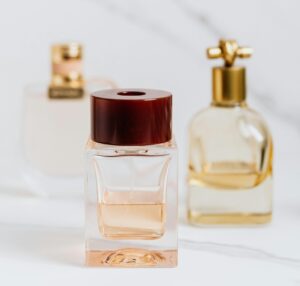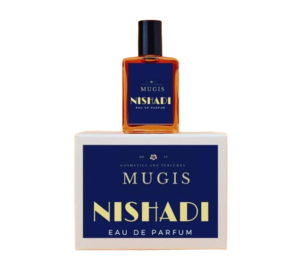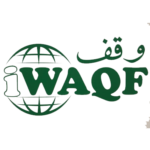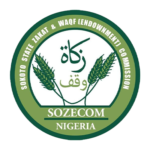Fragrance for Change: Uniting Waqf and Perfumery for Social Impact
By, Ibrahim Abdul Mugis
Introduction
Perfumery, with its rich history and charm, has risen above time and lines, enthralling the faculties and meshing itself into the texture of societies around the world. From the fragrant nurseries of old Egypt to the clamoring markets of middle age Europe, the specialty of perfumery has been loved for its capacity to inspire feelings, save recollections, and improve day to day existence.

Essentially, waqf, well established in Islamic practice, has filled in as a foundation of charity, encapsulating standards of sympathy, liberality, and local area government assistance.
Across the hundreds of years, waqf plays had an essential impact in supporting different cultural requirements, going from schooling and medical care to foundation and social administrations.
Laid out as a never-ending blessing, waqf resources are committed to beneficent purposes, guaranteeing a reasonable wellspring of help for a long time into the future. The idea of waqf mirrors the Islamic ethos of stewardship and collective obligation, underlining the significance of sharing favors and elevating those out of luck.
In this day and age, where ecological maintainability and social effect are progressively focused on, the combination of perfumery and waqf gives a remarkable chance to mix custom development, feel with benevolence. By injecting perfumery with the upsides of waqf manageability, local area strengthening, and generosity – another worldview of moral and socially mindful business can arise.

This cooperative energy among scent and generosity improves the olfactory scene as well as encourages significant commitments to society, making a tradition of positive change and aggregate prosperity.
As we leave on this excursion of aroma for change, let us investigate the extraordinary capability of waqf perfumery to move, inspire, and enable networks around the world. Through imagination, coordinated effort, and obligation to social effect, we can tackle the force of scent to make a more maintainable, comprehensive, and fragrant world for all.
In the Islamic practice, the significance of aroma is wonderfully exemplified by the lessons of the Prophet Muhammad (harmony arrive). The Hadith portrays that the Prophet’s spouses guaranteed he had a fragrance to wear when he ventured out from home, stressing the meaning of charming smell in friendly collaborations.
This training features the Prophet’s consolation of involving fragrance as a way to upgrade individual preparation and decorum. The diction of this Hadith highlights the Prophet’s appreciation for aroma and his craving to introduce himself in the best way while meeting others. By sticking to this Sunnah, or prophetic custom, Muslims can achieve goodness in this world as well as in the great beyond, moving nearer to the All-powerful Allah through the imitating of the Prophet’s commendable direct.
In addition, the Prophet’s affection for aroma is proven and factual, with Musk and Ambergris being among his leans toward fragrances. These sweet-smelling substances were loved gifts that the Prophet never declined, representing his profound appreciation for the tactile joy and otherworldly meaning of aroma.
The Vision: Joining Waqf and Perfumery
The vision to combine waqf standards with the specialty of perfumery is established in the conviction that business can be a power for good. As Ibrahim Abdul Mugis, the pioneer behind Mugis Scents and Awqaf Africa, imagines, this imaginative methodology can reform the fragrance business while having an enduring social effect. By mixing perfumery with the upsides of waqf – like supportability, local area strengthening, and magnanimity – another worldview of moral and socially mindful business can arise.

In the Hadith (“platitudes”) of Muhammad, daʿwah is referenced to accentuate the significance and ideals: “Whoever guides somebody to do kindness gain a similar prize as the person who accomplishes something beneficial.”
Whoever calls to direction will get a similar compensation as the person who follows him with no diminishing in the compensation of his supporter.” Olfactory correspondence is the cycle by which life forms can speak with one
another through various fragrances and scents. This idea highlights the significant effect that scent can have on human insight and association. By saddling the force of fragrance, waqf perfumery tries to draw in individuals on a tactile level, moving positive feelings, encouraging associations, and advancing social union.
Also, the utilization of aroma in strict and profound practices further features its importance in Islamic custom. From the copying of incense during a petition to the use of scent before going to social occasions, scent assumes a focal part in upgrading otherworldly encounters and ceremonies. By integrating waqf standards into the creation and conveyance of fragrances, Ibrahim Abdul Mugis intends to lift the otherworldly element of perfumery, injecting each fragrance with a feeling of direction and significance.

Practical Implementation:
To carry this vision to completion, a few functional advances can be taken:
1. Moral Obtaining: Cooperating with moral providers to guarantee that unrefined components utilized in perfumery are obtained mindfully, regarding both the climate and nearby networks.
2. Reasonable Creation: Taking on eco-accommodating creation techniques and bundling materials to limit natural effects and advance manageability.
3. Local area Commitment: Teaming up with neighborhood networks to enable them through work to open doors, abilities improvement, and fair wages, in this way cultivating monetary strengthening and social union.
4. Humanitarian Drives: Designating a piece of benefits to help worthy missions lined up with waqf standards, like training, medical services, and destitution mitigation, in this manner boosting social effect and adding to the prosperity of society.
5. Instructive Effort: Bringing issues to light about the idea of waqf perfumery through instructive missions, studios, and public occasions, drawing in buyers in significant discourse about the crossing point of business, morals, and social obligation.
Through these drives, waqf perfumery can catalyze positive change, rousing another age of buyers and organizations to embrace standards of manageability, sympathy, and local area government assistance. As Ibrahim Abdul Mugis drives the manner in which in this earth shattering undertaking, he welcomes others to go along with him on this excursion toward a more fragrant, moral, and socially cognizant future.
The Concept of Waqf Perfumery
Waqf, an idea profoundly imbued in Islamic practice, includes the extremely durable devotion of resources for magnanimous purposes. Perfumery, then again, envelops the workmanship and study of making scents that inspire feelings and recollections. By joining these two ideas, waqf perfumery tries to deliver stunning aromas as well as to add to the advancement of society. This all encompassing methodology lines up with the standards of moral industrialism and cognizant free enterprise, where organizations focus on friendly and natural effect close by monetary productivity.
Undifferentiated from the change of craftsmanship displays into galleries, changing over perfumeries into social focuses or historical centers could be investigated. Similarly as notable milestones like Hagia Sophia in Turkey have been reused to serve the public great while producing income for waqf associations, perfumeries could stick to this same pattern. These foundations could exhibit the creativity and history of aroma making, teach guests about the meaning of scents in various societies, and proposition vivid encounters that draw in the faculties.

By changing perfumeries into social centers, waqf associations might not just safeguard the legacy of perfumery at any point yet additionally create feasible pay to help magnanimous drives. Guests to these focuses could buy fragrances and related items, with a part of the returns going towards waqf tasks like training, medical services, and destitution lightening. Along these lines, waqf perfumery fills in as a scaffold among custom and advancement, safeguarding social legacy while encouraging social and monetary turn of events.
Potential Impact Areas
Waqf perfumery holds the commitment of having a significant effect across various spaces. It, right off the bat, can set out monetary open doors by encouraging work and expertise advancement in aroma creation, as well as the development of unrefined substances and foundation of dissemination channels. This angle invigorates neighborhood economies as well as engages people through significant work and limit building.
Also, waqf perfumery can contribute altogether to local area improvement. By directing benefits towards schooling, medical services, and framework projects, it can address squeezing cultural necessities and inspire underestimated networks. These interests in friendly government assistance work on personal satisfaction as well as advance inclusivity and fair admittance to fundamental administrations.
Moreover, waqf perfumery can assume an imperative part in advancing ecological manageability. By obtaining regular fixings mindfully and embracing eco-accommodating practices all through the inventory network, it can limit natural effects and save biodiversity. This obligation to ecological stewardship lines up with Islamic standards of preservation as well as adds to worldwide endeavors towards moderating environmental change and safeguarding the planet for people in the future.
Implementing Waqf Perfumery
The fruitful execution of waqf perfumery requires a cooperative exertion among partners from the fragrance business, Islamic money, and charity areas. Perfumers, scent houses, and retailers can assume a significant part in coordinating waqf standards into their plans of action. This mix might include devoting a piece of their benefits to worthy missions or laying out waqf blessings pointed toward supporting local area projects.
Islamic monetary foundations likewise play a pivotal part to play in working with waqf funding components custom-made to the scent business. By giving admittance to money to manageable development, these organizations can enable organizations to seek after waqf perfumery drives really.
Moreover, magnanimous associations can offer significant aptitude and direction on waqf administration and organization. Their contribution guarantees straightforwardness and responsibility in the usage of assets, in this way encouraging trust among partners and expanding the effect of waqf perfumery drives. Through coordinated effort and aggregate activity, partners can use the groundbreaking capability of waqf perfumery to make enduring social and natural advantages.
All the more thus, perfumers can assign a piece of their pay to put fragrances at mosques and other social communities, in this manner advancing the generosity of waqf. This drive not just improves the olfactory experience inside these shared spaces yet additionally represents a guarantee to cultivating a wonderful and profoundly elevating climate. By coordinating scents into strict and get-togethers, perfumers can add to the social advancement of networks while building up the upsides of liberality and collective fortitude.
Case Studies and Success Stories
Al-Kindi, Al-Isfarayini, and Al-Zahrawi: These authentic figures from the Islamic world made huge commitments to perfumery, exemplifying the upsides of innovativeness, advancement, and generosity. Al-Kindi, known as the “Father of Bedouin Perfumery,” composed broadly on the craftsmanship and study of scent, underscoring the remedial properties of sweet-smelling substances. Al-Isfarayini, an eminent perfumer and researcher, wrote the persuasive composition “Book of the Science of Scent and Refining processes,” which recorded different fragrance making strategies. Al-Zahrawi, a spearheading doctor and specialist, created imaginative strategies for removing characters from plants and blossoms, establishing the groundwork for current perfumery rehearses. Their heritage keeps on rousing perfumers overall to investigate the crossing point of craftsmanship, science, and magnanimity in aroma creation.
Jo Malone: A conspicuous figure in the Western perfumery industry, Jo Malone is known for her eponymous scent brand famous for its craftsmanship and polish. Malone’s excursion in perfumery started with a private company making custom scents, which in the end developed into a worldwide realm. All through her vocation, Malone has stayed focused on altruism, supporting different admirable missions through her image’s drives. Her example of overcoming adversity embodies how an enthusiasm for scent can be changed into a stage for social effect and local area strengthening.
Serge Lutens: One more powerful perfumer from the Western world, Serge Lutens is commended for his cutting edge way to deal with aroma organization. Lutens’ manifestations frequently obscure the lines among workmanship and perfumery, testing regular ideas of fragrance and narrating. His image, Maison Serge Lutens, offers a scope of inventive scents that summon complex feelings and stories. Past his imaginative undertakings, Lutens is effectively associated with generosity, utilizing his foundation to bring issues to light about friendly issues and backing magnanimous drives. His imaginative vision and obligation to social obligation move perfumers to investigate new inventive skylines while having a constructive outcome on society.
Ibn Sina (Avicenna): notwithstanding the referenced perfumers, one more huge figure throughout the entire existence of perfumery, especially in the Islamic world, is the Persian Muslim specialist and scientist, Ibn Sina, otherwise called Avicenna. Ibn Sina presented the method involved with extricating oils from blossoms through refining, which is the system most generally utilized in perfumery today. He directed his underlying analyses with the rose, establishing the groundwork for current perfumery procedures.
Ibrahim Abdul Mugis: Besides, contemporary perfumers like Ibrahim Abdul Mugis from Mugis Scents address a cutting edge encapsulation of the practice of charity inside the aroma business. Ibrahim Abdul Mugis has shown areas of strength for a to magnanimity by supporting different worthy missions through his image’s drives. By dispensing a part of benefits to beneficent undertakings lined up with waqf standards, Ibrahim Abdul Mugis has added to social government assistance and local area improvement, in this manner maintaining the upsides of imagination, development, and generosity in perfumery.
These contextual analyses exhibit how perfumers, both authentic and contemporary, have embraced the standards of imagination, development, and magnanimity in their specialty. By drawing motivation from these trailblazers and their charitable undertakings, perfumers can add to the tradition of waqf perfumery, making scents that amuse the faculties as well as inspire networks and advance social government assistance.
Challenges and Opportunities
Challenges:
Regulatory Barriers: The implementation of waqf perfumery may face regulatory hurdles related to waqf governance, financial regulations, and intellectual property rights. Navigating these complex legal frameworks can be daunting for businesses and philanthropic organizations alike, requiring careful consideration and compliance to ensure transparency and accountability.
Cultural Perceptions: In some cultural contexts, the concept of waqf may be unfamiliar or misunderstood, posing challenges in gaining acceptance and trust among consumers and stakeholders. Educating communities about the principles and benefits of waqf perfumery is essential to overcoming cultural barriers and fostering widespread adoption.
Market Dynamics: The perfume industry is highly competitive and dynamic, with trends, consumer preferences, and market demands constantly evolving. Introducing waqf perfumery into this competitive landscape requires strategic positioning, innovative marketing, and differentiated product offerings to capture market share and sustainably scale operations.
Opportunities:
Innovation: Waqf perfumery presents an opportunity for innovation in fragrance creation, sustainability practices, and business models. By harnessing natural ingredients, adopting eco-friendly production methods, and integrating waqf principles into their operations, perfumers can differentiate their brands and appeal to socially conscious consumers.
Social Impact: Waqf perfumery has the potential to create meaningful social impact by supporting community development projects, empowering marginalized groups, and promoting economic opportunities. By reinvesting profits into waqf endowments, businesses can contribute to education, healthcare, and infrastructure initiatives that benefit society as a whole.
Market Differentiation: In an increasingly crowded marketplace, waqf perfumery offers a
unique value proposition that sets brands apart from competitors. By aligning with the values of ethical consumerism, conscious capitalism, and social responsibility, perfumers can attract discerning consumers who prioritize sustainability and philanthropy in their purchasing decisions.
By addressing these challenges and embracing these opportunities, stakeholders can unlock the full potential of waqf perfumery to create a more sustainable, inclusive, and fragrant future for all. Collaborative efforts, innovative solutions, and a commitment to social impact will be key in realizing this vision of waqf perfumery as a catalyst for positive change.
Conclusion
In conclusion, the convergence of waqf and perfumery presents a compelling vision for a more ethical, sustainable, and socially responsible fragrance industry. By integrating the principles of waqf into perfumery practices, businesses can not only create exquisite fragrances but also make a meaningful difference in the lives of individuals and communities.
As we embark on this journey of fragrance for change, we are reminded of the profound words of the Prophet Muhammad (peace be upon him), who emphasized the importance of charity and benevolence. He said, “The believer’s shade on the Day of Resurrection will be his charity.” Through waqf perfumery, we have the opportunity to embody this noble tradition of giving and leave a lasting legacy of kindness, compassion, and generosity.
By addressing regulatory barriers, cultural perceptions, and market dynamics, and by leveraging opportunities for innovation, social impact, and market differentiation, stakeholders can unlock the full potential of waqf perfumery to create a more sustainable, inclusive, and fragrant future for all.
In essence, waqf perfumery symbolizes the harmonious convergence of tradition and innovation, aesthetics, and altruism. It represents a paradigm shift towards a more conscious and compassionate approach to business, where profit is not the sole objective, but rather a means to create positive change in the world.
As we move forward, let us embrace the spirit of waqf perfumery and strive to make a meaningful difference in the world, one fragrance at a time. Together, we can leave behind a legacy of beauty, goodness, and social impact that transcends generations and enriches the lives of countless individuals.
References
Al-Azmeh, Aziz. (1997). Ibn Khaldun in Modern Scholarship: A Historiographical Study. International Journal of Middle East Studies, 29(4), 471-504.
Asfour, M. S. (1994). Islamic Economics and Finance: A Glossary. Routledge.
Badr, Gamal Moursi. (1992). Islamic Law: Its Relation to Other Legal Systems. The American Journal of Comparative Law, 40(1), 1-24.
Hasan, Zafar Mueen. (2013). Making Waqf Work: A Case Study of Integrating Waqf and Islamic Microfinance for Poverty Reduction in Bangladesh. Journal of Islamic Economics, Banking and Finance, 9(4), 109-124.
Perfume Society. (2023). Fragrance: A Cultural History. London: Thames & Hudson.
Smith, F. G. (1980). The Fragrant Past: Perfumes of Cleopatra and Julius Caesar. Transactions of the American Philological Association, 110, 341-352.
Vallat, F. (2010). A Journey into Fragrance: The History of Perfume from Ancient Egypt to the 21st Century. Parfums Du Monde.
Zuhur, S. (2015). Islamic Traditions of Modern Egypt: Identity and the Practice of Religious Knowledge. Routledge.
#WaqfPerfumery #FragranceIndustry #IslamicFinance #Philanthropy #Sustainability #SocialImpact

Awqaf Africa is a prominent organization dedicated to empowering communities across the African continent. Established to foster sustainable development and social welfare, Awqaf Africa focuses on harnessing the potential of endowments (awqaf) to drive positive change. Through strategic initiatives, partnerships, and impactful projects, Awqaf Africa endeavors to address socio-economic challenges and promote prosperity within African societies.
- Choose your favourite cause
- Register to our website !
- Donate the amount you like
- Stay tuned about cause






Leave a Reply